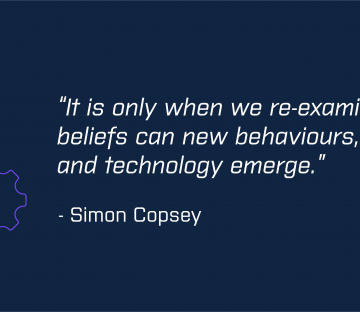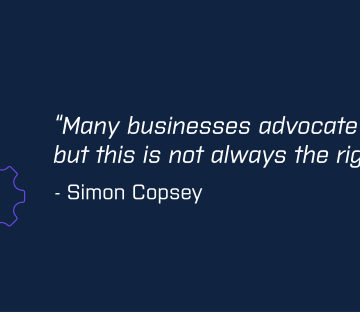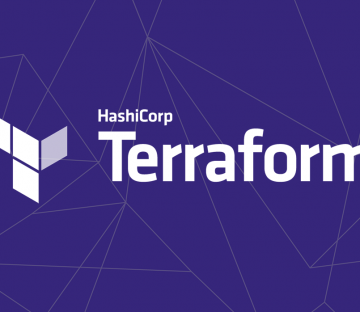33 items found: Search results for "organisational change" in all categories x


May 24, 2022 | Software Consultancy
Watch Simon Copsey’s talk from the Agile Ex Meetup on “Coaching at the Organisational Level” where he explores some of the common downward spirals in IT and the larger organisation, as well as the tools that coaches and individuals can use to surface and discuss them in a way that allows for systemic change, even without formal authority.


September 21, 2015 | DevOps
The drive for change comes from, everywhere. Within IT departments, developers are asking for more control, and want faster response times than can be provided by traditional gatekeeper IT services. Management hears about new technologies allowing more rapid deployments, better ROI, reduction in costs, increased efficiency, and increased scalability, and they want it for their customers. On top of that, systems age, technologies lose their lustre, and technical debt builds up, while it simultaneously gets harder to recruit people from a shrinking talent pool, all of which creates a case for change from within the technology itself.




September 30, 2022 | Blog, Organisational Transformation, Software Consultancy
Watch Simon Copsey’s talk from the Lean-Agile Delivery & Coaching Network and Digital Transformation Meetup on “Seeing Clearly in Complexity” where he explores the Current Reality Tree tool.


October 12, 2015 | DevOps
DevOps is transformative. This (hopefully) won’t be true forever, but it is for now. While the modern management practices of separating development and operations (and to a lesser extent, everyone else) prevail, the tearing down of the walls that separate them will remain transformative. In company after company, management and front-line staff are coming to realise that keeping functions separate, which are inherently interdependent, is a model for blame, shifted responsibility, and acrimony. It’s easy to divvy-up a company up based on function. To many people, it seems the most logical way to do it. Ops does operations, Dev does development, Marketing markets, etc. It seems much harder to do it any other way. So why do it?


August 5, 2015 | Cloud, GCP, Kubernetes
Why OpenCredo partnered with Google
Recently OpenCredo chose to partner with Google in order to share knowledge and resources around the Google Cloud Platform offerings. Our clients come in many shapes and sizes, but typically all of them realise three disruptive truths of the modern IT industry: the (economic) value of cloud; the competitive advantage of continuous delivery; and the potential of hypothesis and data-driven product development to increase innovation (as popularised by the Lean Startup / Lean Enterprise motto of ‘build, measure, learn’).


October 12, 2023 | Blog, Platform Engineering
Check out our latest blog “Event Driven Load Testing” which explores how, through some smart automation techniques, testing strategies can be adapted to support scale-up organisations where there are potentially many disparate teams needing to work together.


June 29, 2022 | Blog, Organisational Transformation, Software Consultancy
Many businesses advocate for efficiency, but this is not always the right goal.
In part one of this article, we explored how product teams can balance two important considerations – efficiency and effectiveness.
In this second part we will introduce the – often unexpected – implications of turning to technology to bring about efficiency and wider change, and the deeper considerations that must be addressed first.


June 14, 2022 | Blog, Culture, White Paper
Many businesses advocate for efficiency, but this is not always the right goal. Part one of this article explores how product teams can balance two important considerations – efficiency and effectiveness. Part two builds on this idea, uncovering the non-obvious implications of using technology to bring about efficiency and wider change.


October 3, 2019 | Cloud, DevOps, Hashicorp, Open Source
Terraform 0.12 in recent years has emerged as the de facto standard with regards to defining and managing cloud infrastructure. It is one of four primary tools offered by HashiCorp, (Terraform, Vault, Consul and Nomad) and underpins the workflows that make up their Cloud Operating Model.
Since its first release in 2014, the wider Terraform community has embraced frequent releases and this past year has been no exception. HashiCorp announced the release of Terraform 0.12 in May 2019 and as of writing this post the official release is 0.12.9.


August 14, 2019 | Culture, News
Here, in our little nook of the internet, we usually write about our experiences of emerging technologies, the tricky coding problems we’ve solved and how we have enhanced our clients’ businesses. We do this because we are very proud of this work. It truly matters.
Today is a little different. Today I’d like to share something a little more personal. Something that brings loneliness, kindness and technology together in an oxytocin-generating, slightly awkward embrace. Because hugs matter too.


July 31, 2018 | Machine Learning
Machine Learning, alongside a mature Data Science, will help to bring IT and business closer together. By leveraging data for actionable insights, IT will increasingly drive business value. Agile and DevOps practices enable the continuous delivery of business value through productionised machine learning models and software delivery.


July 13, 2018 | Software Consultancy
As a consultant I often find myself in situations that require tricky problem solving, typically of a technical nature. Yet although it is common to approach a consultancy engagement in terms of its technical context, not all problems have a purely technical solution.


May 16, 2018 | Microservices
To identify service boundaries, it is not enough to consider (business) domains only. Other forces like organisational communication structures, and – very important – time, strongly suggest that we should include several other criteria in our considerations.


April 18, 2018 | Microservices
Quite a few of the anti-patterns we observe today on microservices projects are strongly related to how people approach the problem. Given their nature, these anti-patterns tend to be deeply ingrained and self-sustaining. Addressing them starts with increased awareness and by changing ways of approaching the problem, rather than by the introduction of yet another technical tool or framework.


July 3, 2016 | DevOps
Several of us from the OpenCredo team were in attendance at the inaugural EU edition of the DevOps Enterprise Summit conference. We have been big fans of the two previous US versions, and have watched the video recordings of talks (2014, 2015) with keen interest as many of our DevOps transformation clients are very much operating in the ‘enterprise’ space.


March 2, 2016 | DevOps, Microservices
Many of our clients are currently implementing applications using a ‘microservice’-based architecture. Increasingly we are hearing from organisations that are part way through a migration to microservices, and they want our help with validating and improving their current solution. These ‘microservices checkup’ projects have revealed some interesting patterns, and because we have experience of working in a wide-range of industries (and also have ‘fresh eyes’ when looking at a project), we are often able to work alongside teams to make significant improvements and create a strategic roadmap for future improvements.


March 2, 2016 | Microservices
Microservice-style software architectures have many benefits: loose coupling, independent scalability, localised failures, facilitating the usage of polyglot data persistence tools or multiple programming languages.
However, they also introduce other challenges. A major one is the fact that the end-user functionality of the system will ultimately emerge as a composition of multiple services. This significantly increases the complexity of deploying the system. In addition, because we lose the concept of “versions” of the system, it becomes harder to answer questions like “what capabilities are in production?” and “when is a new feature considered ‘done’?”.


January 30, 2016 | Microservices
The OpenCredo team will be presenting two sessions on our recent learnings with implementing microservices at the OOP Conference, which will be running from the 1st – 5th February. We will also be running a booth, and so if you are interested in learning more about our recent projects, are keen to see if we can help you with your latest technical or organisational challenges, or want to join our team, then stop by and say hello!


January 8, 2016 | Microservices
Many of our clients are in the process of investigating or implementing ‘microservices’, and a popular question we often get asked is “what’s the most common mistake you see when moving towards a microservice architecture?”. We’ve seen plenty of good things with this architectural pattern, but we have also seen a few recurring issues and anti-patterns, which I’m keen to share here.


January 7, 2016 | DevOps, Software Consultancy
Good consulting is, by its nature, an act of collaboration. We recently helped a company with a variety of challenges – some architecture, some coding, some systems, some people, some process (normal consultancy challenges) – unique to this client. During the project, we formalised some things we had thought before, but which had never crystallised – all the work we did was transformative. Whether it’s a code review, process review, DevOps implementation, or outright transformation, the primary goal is the same – improving flow. Flow (sometimes known as throughput) is the movement of raw materials through a system to become finished goods. It’s analogy in the service industry is the movement of customer requirements through to usable solution. And we help improve it.


December 16, 2015 | Cloud, DevOps
In the rush to embrace DevOps, many organisations seek out tools to help them achieve DevOps nirvana; the magical tools that will unify Development and Operations, stop the infighting, and ensure collaboration. This search for tools to solve problems exists in many domains, but seems particularly prevalent in IT (it may be real, or a reflection of my exposure to IT). The temptation to embrace new tools as a panacea is high, because the problems in IT seem so pervasive and persistent.




November 24, 2015 | DevOps, Microservices
It was once again a privilege to present at the annual ‘muCon 2015‘ microservices conference held in London (at the shiny new Skillsmatter CodeNode venue). Based on feedback fro talks I gave earlier in the year, I presented a completely new version of my ‘The Business Behind Microservices‘ talk, which focuses on the organisational and people side of implementing a microservice-based application.


September 24, 2015 | Microservices
Unless you’ve been living under a (COBOL-based) rock for the last few years, you will have no doubt heard of the emerging trend of microservices. This approach to developing ‘loosely coupled service-oriented architecture with bounded contexts’ has captured the hearts and minds of many developers. The promise of easier enforcement of good architectural and design principles, such as encapsulation and interface segregation, combined with the availability to experiment with different languages and platforms for each service, is a (developer) match made in heaven.


September 18, 2015 | Microservices
We’re pleased to begin our series of OpenCredo webinars with “The Business Behind Microservices”, which takes a look at the some of the business and organisational challenges that come along with the decision to implement microservices.


August 10, 2015 | Cloud, Software Consultancy
As a company, we at OpenCredo are heavily involved in automation and devOps based work, with a keen focus on making this a seamless experience, especially in cloud based environments. We are currently working within HMRC, a UK government department to help make this a reality as part of a broader cloud broker ecosystem project. In this blog post, I look to provide some initial insight into some of the tools and techniques employed to achieve this for one particular use case namely:
With pretty much zero human intervention, bar initiating a process and providing some inputs, a development team from any location, should be able to run “something”, which, in the end, results in an isolated, secure set of fully configured VM’s being provisioned within a cloud provider (or providers) of choice.


July 4, 2013 | Software Consultancy
In which situations Spring Data Hadoop (SDH) can add value, and in which situations would it be a poor choice? This article follows on from an objective summary of the features of SDH.